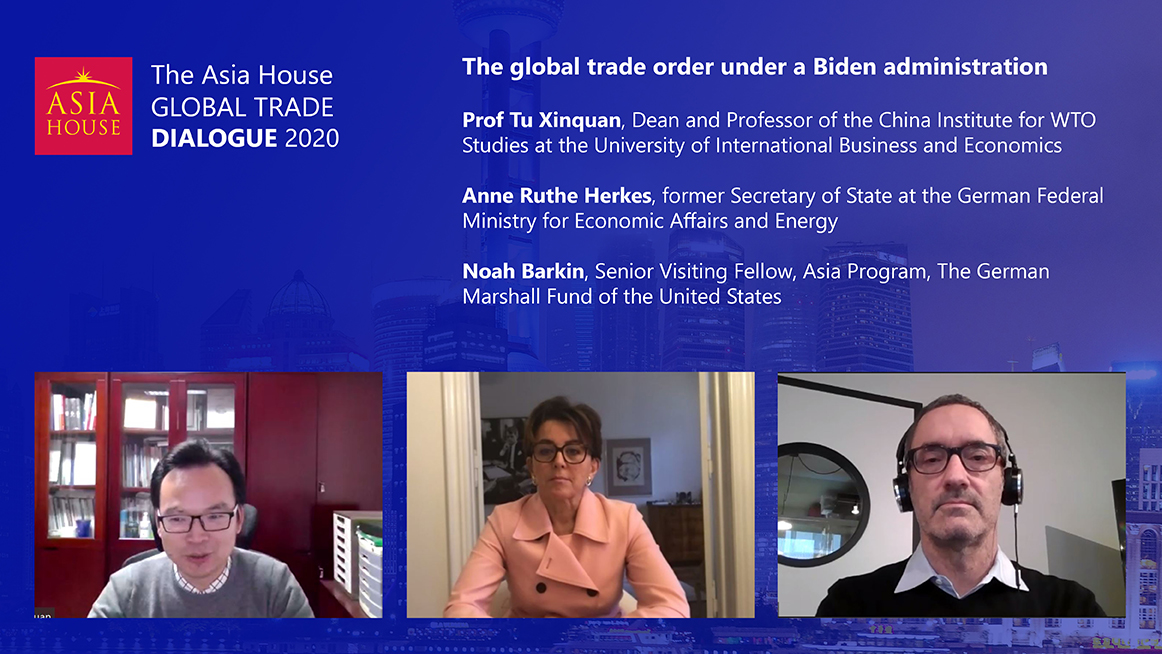Driving commercial and political engagement between Asia, the Middle East and Europe
Driving commercial and political engagement between Asia, the Middle East and Europe
Driving commercial and political engagement between Asia, the Middle East and Europe

A Biden administration in the US is likely to see a change of approach by Washington on both China and Europe, leading policy experts told this year’s Asia House Global Trade Dialogue.
WATCH THE DISCUSSION IN FULL HERE
According to Noah Barkin, Senior Visiting Fellow, Asia Program at The German Marshall Fund of the United States, Biden is likely to tone down the rhetoric against Beijing, choosing to focus on China’s behaviour on the world stage as opposed to attacking the legitimacy of its political system, as President Trump did.
“During the [election] campaign, Biden did not conspicuously refer to China as an adversary,” Barkin said. “He calls them a ‘competitor’. I think that may open the door to dialogue on various common interests, such as the pandemic and climate change.”
However, Barkin believes the broader US position on China will endure. “I think it would be wrong to expect a change in the thrust of US policy,” he said.
Barkin also predicted that the Biden administration will make a concerted push with allies in Asia and Europe for a common front, which he believes is “essential” if Western democracies are going to have any influence over China.
Chinese concerns
This is something that is causing concern in China, according to Professor Tu Xinquan, Dean and Professor of the China Institute for WTO Studies at the University of International Business and Economics in Beijing.
“Some people argue that Biden is even more dangerous to China” than Trump, he said. “There is a concern in China that the US will work with its allies to make new international rules with the exclusion of China.”
Professor Tu also took aim at US conduct in the WTO, referring to the decision to paralyse the Appellate Body as “the most ridiculous and notorious thing done by the Trump Administration”.
“While the US has been claiming to be the model of rule of law, it would go so far as to shut down the Appellate Body simply because it cannot win in some cases,” Professor Tu said. For him, the “biggest immediate expectation” of the Biden Administration would be the revival of the Appellate Body and a return to respecting existing international rules.
US allies in Asia and Europe
Better relations between the US and Europe was something Anne Ruth Herkes, former Secretary of State at the German Federal Ministry for Economic Affairs and Energy, is hopeful of, describing Biden’s election win as a “chance of a generation to renew the alliance.”
While referring to Biden as a “friend of Europe”, Herkes also expressed a hope of Europe having a more positive relationship with China.
“The name of the game is to find important, strategic areas of collaboration,” she said. “Be it fighting the pandemic, be it restoring global trade, or attacking security issues.”
But Herkes added that while there is a need to collaborate on shared challenges, contentious issues must be raised where needed, including digital concerns and certain features of China’s economy.
Tech tensions are certain to remain a contentious issue in the US-China relationship, Barkin noted, but there is uncertainty over how the Biden Administration will approach the issue, he said.
“I don’t think we’re going to see big changes in the US approach to Huawei under a Biden Administration. I think the big difference will be the US getting together with allies in Asia and Europe and trying to develop a common strategy on technology.”
Professor Tu was optimistic that sufficient common ground can be found to see China integrate more into the international system. “As long as the competition is peaceful and equitable, we will finally construct a common ground for everyone,” he said.
China’s participation in the RCEP and CPTPP were also discussed during the session, which was chaired by Asia House Chief Executive Michael Lawrence.
